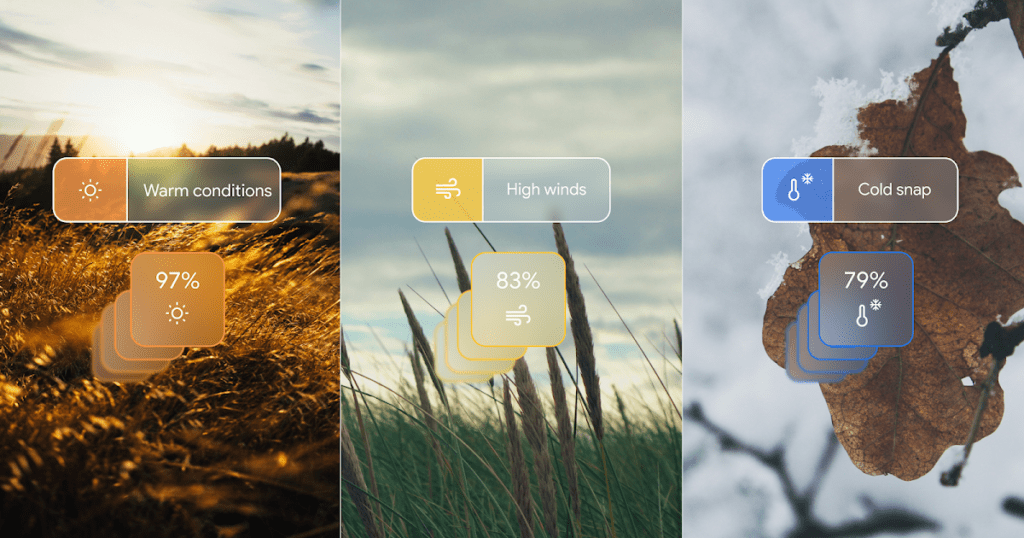Technologies
Published: 4 December 2024
Authors: Ilan Price and Matthew Willson
A Revolutionary AI Weather Forecasting Model for Enhanced Prediction Accuracy and Risk Assessment
Weather plays a vital role in our daily lives, influencing our decisions, safety, and lifestyle choices. As climate change leads to more extreme weather events, the need for precise and reliable forecasts has never been greater. Traditional weather predictions, unfortunately, often falter beyond a few days. Here’s where cutting-edge technology steps in.
Recognizing that perfect weather predictions are unattainable, scientists have turned to probabilistic ensemble forecasts. These models generate a spectrum of potential weather scenarios, giving decision-makers a comprehensive overview of likely conditions. Today, we’re excited to introduce GenCast, a new high-resolution AI ensemble model that enhances forecast accuracy for both regular weather patterns and extreme events, extending predictions up to 15 days ahead.
The Evolution of AI in Weather Forecasting
GenCast represents a significant leap in AI-driven weather prediction, moving beyond previous deterministic models, which provided single forecasts. In contrast, GenCast utilizes an ensemble approach with over 50 predictions, each depicting different potential weather trajectories.
This innovative model employs a diffusion technique, akin to what powers recent advancements in generative AI for images and music, but is uniquely tailored to comprehend the Earth’s spherical geometry. By analyzing four decades of historical ECMWF weather data, GenCast has learned to generate complex probability distributions regarding future weather scenarios.
Setting a New Standard for Safety and Preparedness
To validate GenCast’s effectiveness, we compared it against historical data up to 2018 and tested it with 2019’s data. The results were striking: GenCast outperformed the ECMWF’s ENS in forecast accuracy. We rigorously examined 1,320 different forecasting scenarios and found that GenCast was more accurate than ENS 97.2% of the time, increasing to an impressive 99.8% for forecasts beyond 36 hours.
Enhanced forecasts of extreme weather events empower timely and cost-effective preventative actions. GenCast proves superior to ECMWF in preparing for any extreme weather scenario.
By expressing uncertainty through diverse predictions, GenCast helps convey the confidence levels in forecasts. For instance, if numerous predictions suggest a cyclone is headed for the same area, the uncertainty is minimal; conversely, varied predictions signal higher uncertainty. GenCast strikes a harmonizing balance, ensuring it neither exaggerates nor downplays its forecasts.
Remarkably, a single Google Cloud TPU v5 takes just 8 minutes to produce a complete 15-day ensemble forecast. In contrast, traditional physics-based models like ENS require vast supercomputing resources and hours of processing time, even at a slightly lower resolution.
Advanced Predictions for Saving Lives
Accurate extreme weather predictions don’t just inform plans; they save lives and prevent costly damages. GenCast has excelled in forecasting scenarios like extreme heat, cold spells, and high wind speeds, proving more effective than its predecessors.
When it comes to predicting tropical cyclones, GenCast provides actionable insight on where these storms are likely to strike, significantly enhancing preparedness and response efforts.
GenCast’s ensemble forecast illustrates a variety of possible paths for Typhoon Hagibis, showcasing how predictions tighten as the storm nears land, thus enhancing confidence in the forecasted track.
Accurate weather forecasting also plays a pivotal role in sectors like renewable energy. Improved forecasting of wind power can considerably boost its reliability, accelerating its adoption as a sustainable energy source. In recent tests, GenCast outperformed traditional models in predicting total wind power output from global wind farm arrays.
A New Chapter in Weather Forecasting at Google
GenCast is just one part of Google’s expanding suite of AI-driven weather prediction models, which also includes advanced deterministic models and pioneering systems for flooding, wildfires, and extreme heat forecasts. These tools are set to enhance user experiences on platforms like Google Search and Maps, making weather data more accessible and actionable.
We value our collaboration with weather agencies and remain committed to integrating AI into traditional meteorological methods. By releasing GenCast as an open model, along with its code and weights, we aim to foster collaborative research that amplifies weather forecasting capabilities.
Soon, we’ll provide real-time and historical forecasts from GenCast, and previous models, allowing broader access for integration into various research efforts and real-time applications.
The potential for innovation is vast, and we invite all stakeholders—from academia to renewable energy firms—to participate in this exciting journey. Collaborating with the community will unlock deeper insights and pave the way for impactful advancements in weather forecasting.
Acknowledgements
We’d like to express our gratitude to Raia Hadsell and the entire ECMWF team for their invaluable support and feedback. We also appreciate the legal and licensing assistance provided by Molly Beck, Ben Gaiarin, Roz Onions, and Chris Apps. This collaborative effort reflects the contributions of our co-authors, whose collective expertise was vital in advancing this research.
The AI Buzz Hub team is excited to see where these breakthroughs take us. Want to stay in the loop on all things AI? Subscribe to our newsletter or share this article with your fellow enthusiasts.




